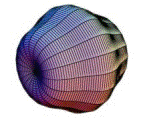Department of Physics and Astronomy: Publications and Other Research

Timothy J. Gay Publications
Document Type
Article
Date of this Version
2014
Citation
PHYSICAL REVIEW LETTERS 113, 118103 (2014)
DOI: 10.1103/PhysRevLett.113.118103
Abstract
We have studied dissociative electron attachment in sub-eV collisions between longitudinally polarized electrons and chiral bromocamphor molecules. For a given target enantiomer, the dissociative Br anion production depends on the helicity of the incident electrons, with an asymmetry that depends on the electron energy and is of order 3 × 10−4. The existence of chiral sensitivity in a well-defined molecular breakup reaction demonstrates the viability of the Vester-Ulbrict hypothesis, namely, that the longitudinal polarization of cosmic beta radiation was responsible for the origins of biological homochirality.


Comments
© 2014 American Physical Society. Used by permission.